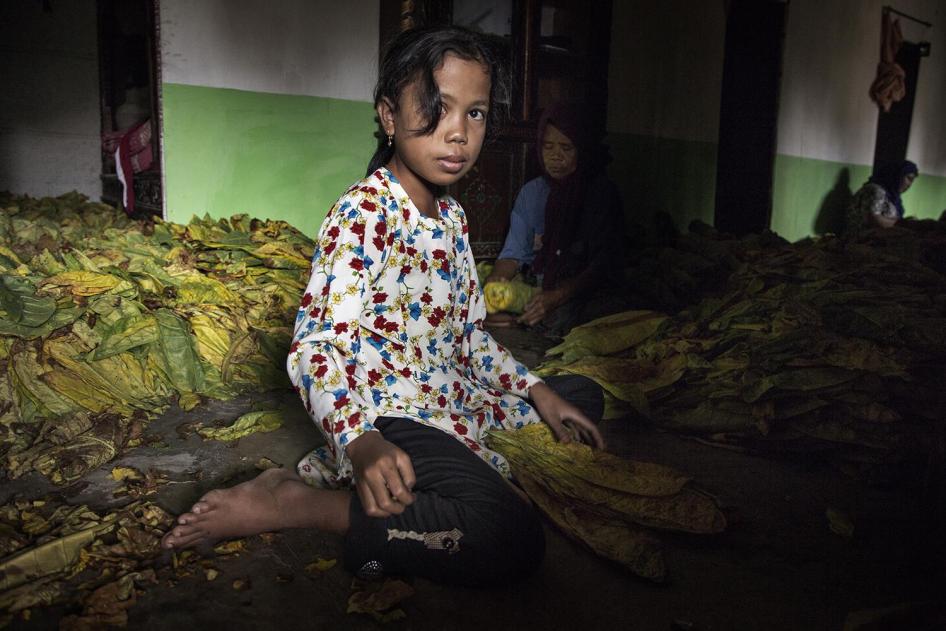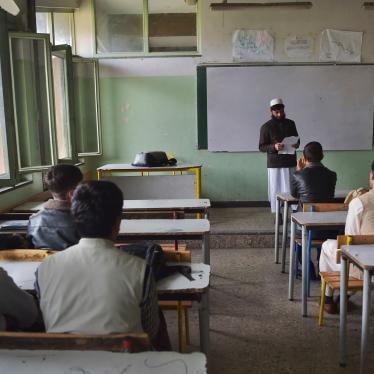In the next week, Indonesian President Joko (“Jokowi”) Widodo will decide whether to encourage parliament to move forward with a draft tobacco bill aimed at increasing domestic tobacco production. The bill would gut many important existing health regulations, like the requirement that companies include a health warning with a picture on the label of tobacco products.
Those are troubling proposals given that millions of children in Indonesia start smoking each year, and that 40 million more are “passive smokers” from secondhand smoke. The Indonesian Ministry of Health, 17 prominent health organizations, and many others have denounced the measure as an attempt to undermine Indonesia’s already weak tobacco control laws. Jokowi should reject the bill.
But the draft bill is not the only tobacco policy issue awaiting action by the Jokowi administration. Each year in Indonesia, thousands of children, some just 8 years old, work in hazardous conditions producing tobacco that ends up in products marketed and sold by huge Indonesian and multinational tobacco companies.
My colleagues and I published a Human Rights Watch report documenting hazardous child labor on Indonesian tobacco farms last May. Since then, another tobacco season has come and gone, but the child workers behind Indonesia’s tobacco industry remain unprotected.
We interviewed 132 children who worked on tobacco farms in four of Indonesia’s biggest tobacco-producing provinces. We found that child workers are exposed to nicotine and pesticides—toxins that can be especially harmful to children who are still growing and developing. Half the children we interviewed had experienced nausea, vomiting, headaches, or dizziness while they worked. Those symptoms are consistent with acute nicotine poisoning, which happens when workers handle tobacco plants and absorb nicotine through their skin. Many children said they also mixed and sprayed toxic chemicals on the plants with no protective equipment, and some became violently ill afterward.
The families we interviewed did not intentionally put their children in harm’s way. They were committed to helping their children get an education so they could have a better future. Indeed, most of the children we interviewed attended school and worked in tobacco farming only outside of school hours.
But direct contact with tobacco in any form is hazardous work for children because of the nicotine in the leaves. Most of the families we spoke with had never received comprehensive information about the hazards for children of work on tobacco farms, so they did not know the risks to their children.
We urged the Jokowi government to take action to protect children from danger in tobacco fields. We called on the Health Ministry to work with other ministries to develop a public education campaign to raise awareness of the dangers to children of work on tobacco farms. In recent meetings with Human Rights Watch, government officials have said they need additional support and resources to get the campaign underway this year.
Indonesia already prohibits children under 18 from work “with harmful chemical substances.” The Ministry of Manpower and Transmigration should explicitly prohibit children from working in direct contact with tobacco in any form and increase labor enforcement efforts to make sure government inspectors check for workers’ safety, especially on small tobacco farms where children might be in danger.
In our meetings with government officials, we have heard many times that the tobacco industry is powerful in Indonesia, and that it is difficult to achieve policy changes the industry opposes. Surely eliminating child labor in tobacco farming is an issue tobacco companies also want to address.
The UN Guiding Principles on Business and Human Rights make clear that companies have responsibilities for addressing human rights abuses in their supply chains. We shared our findings with the largest tobacco companies operating in Indonesia—Djarum, Gudang Garam, Philip Morris International (which owns Sampoerna), British American Tobacco (which owns Bentoel), and others. The large multinational tobacco companies have policies to prevent children from doing the most dangerous tasks on tobacco farms, but their policies are not strong enough, and they should do more to monitor for child labor when they buy Indonesian tobacco on the open market through traders.
The largest Indonesian companies—Djarum and Gudang Garam—do not appear to be taking any steps to prevent or address child labor in their supply chains. They have never responded to our many requests for information and meetings, and they do not make any information publicly available about their child labor policies.
These companies should not be profiting off the backs of Indonesian child workers.
Two months from now, the next tobacco-growing season will be underway, and children will be heading to the fields again. The controversy around the draft tobacco bill likely will not be resolved by then. But with decisive action, the Jokowi administration and tobacco companies could take steps to protect children from dangerous work in tobacco fields. Their futures depend on it.










